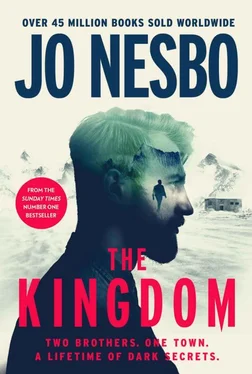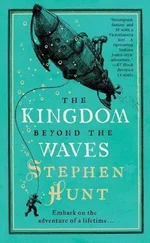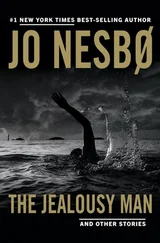All? I roared inwardly. You, don’t you mean? It’s that same old damned imperative, Kurt Olsen, you want to sort out something your father couldn’t sort out.
‘Fine,’ I said instead. ‘And you’re right, it’s a sensitive matter. Carl and I know the big picture of what happened, so our focus has been more on trying to forget than on getting to the bottom of every little detail.’ Calm down. Like that, yeah. Like that.
‘Naturally,’ said Olsen.
The drone appeared over the edge again. Stopped, just hovering in the air, nagging at the ears. Then it navigated in towards us, and landed in the hand of the guy with the remote control, like those trained falcons I’d seen on YouTube landing on their owner’s glove. It was unpleasant, like something from a science-fiction film set in a Big Brother Sees You fascist state, and you know that the guy with the drone has bundles of electric cable running under his skin.
‘That was a quick trip,’ said the sheriff, dropping his cigarette to the ground and stepping on it.
‘The thin air is a drain on the batteries,’ said the drone guy.
‘But did it get any pictures?’
The drone guy touched the screen of his phone and we huddled round him.
Lacking light and sound the video imagery was grainy. Or maybe there was sound recording and it was just that silent down there. The wreck of Dad’s Cadillac DeVille looked like a beetle that had landed on its back and died there, legs helplessly flailing in the air until a passer-by inadvertently trod on it. The rusting and partly overgrown chassis and wheels facing upwards were undamaged, but the rear of the coupé was crimped flat as though it had been through Willumsen’s car-crusher. Maybe because of the stillness and darkness down there the pictures reminded me of a documentary film I had seen about divers going down to the Titanic . Maybe it was the sight of the Cadillac, another wreck with beautiful lines from a vanished age, another narrative of sudden death turned into a tragedy and related so often that in my imagination and the imagination of others it had, with the years, come to seem like something that had to be there, that it was written in the stars. The physical and metaphorically spectacular, the presumed invincibility of the machine exposed as it plummeted to the depth. Presentations of how it must have been, the fear of the passengers as it dawns on them that here it is now: death. Not just any old death, not a lived life gradually breaking down, but an unannounced and sudden departure, the murderous coincidences. I shuddered.
‘Quite a few loose boulders on the slope,’ Erik Nerell remarked.
‘They could have fallen down there a thousand years ago, or a hundred,’ said Kurt Olsen ‘There’s none on top of the car. And I don’t see any marks or dents in the chassis either, so for all we know not a single bloody rock has fallen down there since the one that hit the climber.’
‘He’s not climbing any more,’ said Nerell as he peered at the screen. ‘His arm just dangles by his side and it’s only half the size it used to be. He’s been on painkillers for years. Doses big enough to knock a horse out.’
‘At least he’s still alive,’ Olsen interrupted impatiently. His face was flushed. When he said ‘alive’, did he mean, unlike those who had been sitting in the Cadillac? No, it was just something he came out with. And yet there was something else there. Was it the old sheriff he was talking about? Sigmund Olsen, his own father?
‘Most of what falls down into this chute is bound to hit the car,’ said Olsen and pointed to the screen. ‘And yet it’s overgrown with moss. Not a mark on it. That tells us its history. History is something we can learn from. Lines that can be traced backwards can be traced forwards too.’
‘Until you get a rock on your shoulder,’ I said. ‘Or your head.’
I saw Erik Nerell nodding slowly as he scratched his chin. Olsen flushed even more.
‘As I said, we hear loose rocks down in Huken all the time.’ I was looking directly at Olsen, but my words were obviously directed at Erik Nerell. He was the one who was about to become a father. He was the one responsible for an expert assessment of whether or not it was justifiable to send a crew down there to investigate the wreck. Clearly Olsen couldn’t ignore his advice without losing his job should something happen. ‘Maybe the rocks don’t hit the wreck directly,’ I said. ‘But they land beside it. Presumably that’s where your people will be standing?’
I didn’t need to hear Olsen’s reply. Out of the corner of my eye I could see that particular battle had already been won.
I stood on Geitesvingen as the sound of their cars faded. Watched a raven glide by, waited until everything was silent once again.
Shannon, dressed as usual in black, was leaning against the worktop when I came in. Again it struck me that despite an outfit that accentuated the almost boyish skinniness of her body, there was something distinctively feminine about her. Her small hands warmed themselves around a steaming cup with the string of a tea bag dangling over the rim.
‘Who was that?’ she asked.
‘The sheriff. He wants to examine the wreckage. He thinks he needs to find out why Dad went over the edge into Huken.’
‘And doesn’t he?’
I shrugged. ‘I saw it all. He didn’t brake until it was too late. You have to brake in time.’
‘You have to brake in time,’ she repeated with a slow, farmer’s nod of the head. Looked like she was already picking up our body language too. It made me think of those science-fiction films again.
‘Carl said it’s not possible to retrieve the wreckage. Does it bother you having it there?’
‘Apart from the pollution aspect? No.’
‘No?’ She lifted the mug with both hands again, took a sip of tea. ‘Why not?’
‘If they’d died in the double bed we wouldn’t have thrown that out either.’
She smiled. ‘Is that being sentimental or being unsentimental?’
I smiled too. Hardly noticed that lazy eyelid of hers any more. Or maybe it didn’t hang as low as it did when she arrived and was still tired from all the travelling.
‘I think the practical circumstances dictate more of our emotional lives than we realise,’ I said. ‘Even though novels are about unattainable love, nine out of ten fall in love with someone they know they can have.’
‘You sure?’
‘Eight out of ten,’ I said.
I stood beside her and noticed that she watched me as I used the yellow measuring spoon to spoon the coffee powder into the pot.
‘Practical in death and love,’ I said. ‘That’s the way it is when things are tight the way they are for the people round here. It’s probably not normal for you.’
‘Why should it not be normal?’
‘Barbados is a wealthy island, you said. You drove a Buick, went to university. Moved to Toronto.’
She seemed to hesitate for a moment before replying. ‘It’s called social mobility.’
‘Are you saying you grew up poor?’
‘Yes and no.’ She took a deep breath. ‘I’m a redleg.’
‘Redleg?’
‘You’ve probably heard of the lower-class whites in the Appalachian mountains in the USA. What people call hillbillies?’
‘ Deliverance . Banjos and incest.’
‘That’s the stereotype, yes. Unfortunately some of it’s accurate, just as it is with the redlegs, the lower-class whites in Barbados. The redlegs are the descendants of the Irish and the Scots who came to the island in the seventeenth century, a lot of them transported convicts, same as in Australia. In practice they were slaves, and it was they who made up the workforce until Barbados began to import slaves from Africa. But once slavery was abolished and the descendants of the Africans began to move up in society, most of the white redlegs got left behind. Most of us live in our own shanty town. Rønner , I think that’s what you say in Norwegian. We’re a society on the outside of society, stuck in a poverty trap. Zero education, alcoholism, incest, sickness. The redlegs in St John on Barbados rarely own anything, apart from the few who have farms and small shops serving the wealthier blacks. Other redlegs live off the state, financed by the black and brown Bajanere. Know how you can recognise us? The teeth. If we have any then they’re usually brown from… decay ?’ she concluded, using the English word.
Читать дальше












